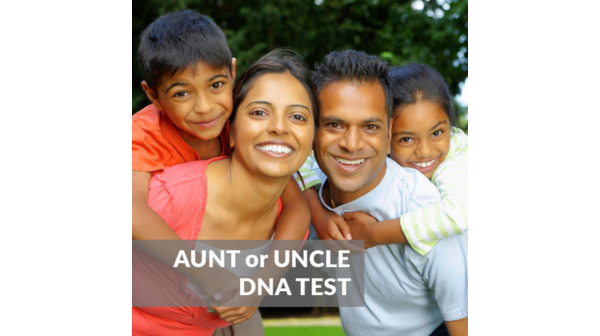What is Aunt Uncle Testing?
Aunt and uncle DNA testing is a type of genetic test that aims to determine the likelihood of a biological relationship between an alleged aunt or uncle and a niece or nephew. This type of testing is often used when the alleged parents of the niece or nephew are unavailable or unwilling to provide samples for testing.
This type of testing examines the DNA you’ve inherited from both parents and can be used to determine the degree of genetic relatedness between individuals, including aunts, uncles, and their nieces or nephews.

Key points about paternity trio testing
Aunt and uncle DNA testing is conducted to assess the probability of a biological relationship between the tested individuals, typically aunts or uncles, and their nieces or nephews.
Testing Methods
- The testing process involves comparing the DNA profiles of the alleged aunt or uncle and the niece or nephew. This is usually done using a non-invasive and painless method, such as collecting cheek swab samples.
- The focus of the test is on identifying shared genetic markers between the alleged aunt or uncle and the niece or nephew. The more genetic markers that match, the higher the probability of a biological relationship.
- Results are provided in the form of a probability of relationship. A higher probability indicates a stronger likelihood of a biological relationship, while a lower probability suggests a lower likelihood.
Considerations
- Aunt and uncle DNA testing can assess relationships on both maternal and paternal sides. The analysis may determine whether the tested individuals share genetic material inherited from common grandparents.
- The testing process typically involves non-invasive sample collection using cheek swabs. This is a simple and painless method suitable for individuals of all ages.
- Aunt and uncle DNA testing may be sought for various reasons, including personal curiosity, family reunification, inheritance matters, or legal cases where establishing an aunt or uncle relationship is important.
Legal and Ethical Considerations
- Like other DNA testing involving family members, aunt and uncle DNA testing may require the consent of all parties involved. Legal and ethical considerations should be taken into account, especially when minors are involved.
- The accuracy of aunt and uncle DNA testing depends on the number and types of genetic markers analyzed.
- It’s crucial to interpret the results of aunt and uncle DNA testing with care. While a high probability indicates a strong likelihood of a biological relationship, the results should be considered in the context of the specific testing method used and the limitations of genetic testing.
Applications of Aunt Uncle Testing
may be used in situations where family members have been separated, and individuals want to confirm or establish biological relationships for the purpose of reuniting with family members.
- can be relevant when determining inheritance matters. Establishing a biological relationship may impact the distribution of assets and inheritance rights.
can be used to confirm or establish biological relationships when individuals are seeking to reunite with biological family members.
may be applied in legal cases, such as child custody disputes, where establishing a biological relationship is crucial for determining custody arrangements or visitation rights.
may need to prove a biological relationship between an aunt or uncle and a niece or nephew for family reunification or immigration purposes.
can be used for identity confirmation, particularly when individuals have doubts about their biological relationships and seek scientific verification.
It is important for understanding shared medical history and genetic traits. This information can be valuable for genetic counseling and healthcare decisions.
For personal reasons, such as resolving doubts about their familial relationships and gaining peace of mind.
Used for determining the distribution of assets and inheritance rights.
It can contribute to genealogical research by confirming or establishing biological relationships within family branches. This can help individuals build accurate family trees and understand their heritage.
Can contribute to genetic research studies, helping scientists gain insights into familial relationships, inheritance patterns, and population genetics.
To seek a legal name change based on a claimed relationship with an aunt or uncle. Aunt and uncle DNA testing can provide evidence to support such legal processes.
